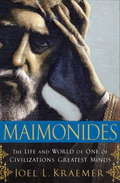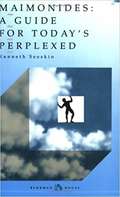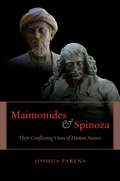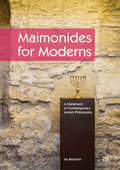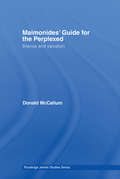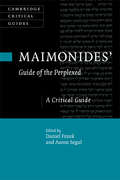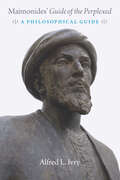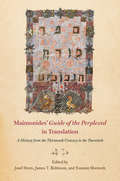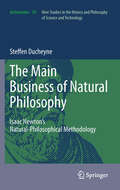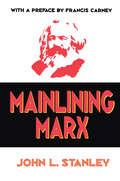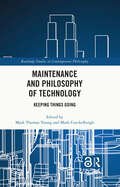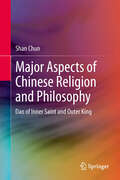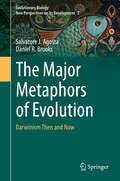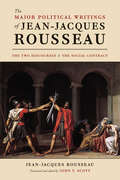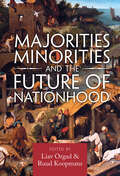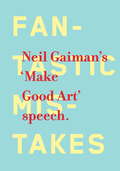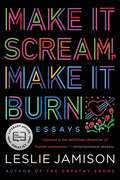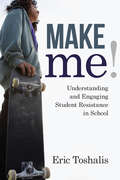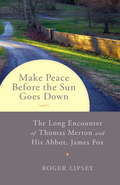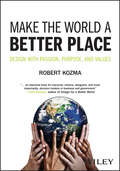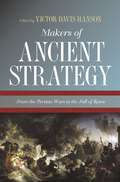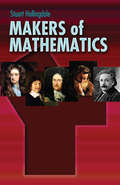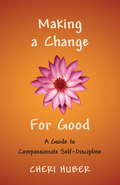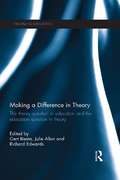- Table View
- List View
Maimonides
by Joel L. KraemerLeading scholars have combined forces to produce this volume on the philosophy and legal views of Moses Maimonides (1138-1204) and the historical context in which he worked.
Maimonides and Spinoza: Their Conflicting Views of Human Nature
by Joshua ParensUntil the last century, it was generally agreed that Maimonides was a great defender of Judaism, and Spinoza--as an Enlightenment advocate for secularization--among its key opponents. However, a new scholarly consensus has recently emerged that the teachings of the two philosophers were in fact much closer than was previously thought. In his perceptive new book, Joshua Parens sets out to challenge the now predominant view of Maimonides as a protomodern forerunner to Spinoza--and to show that a chief reason to read Maimonides is in fact to gain distance from our progressively secularized worldview. Turning the focus from Spinoza's oft-analyzed Theologico-Political Treatise, this book has at its heart a nuanced analysis of his theory of human nature in the Ethics. Viewing this work in contrast to Maimonides's Guide of the Perplexed, it makes clear that Spinoza can no longer be thought of as the founder of modern Jewish identity, nor should Maimonides be thought of as having paved the way for a modern secular worldview. Maimonides and Spinoza dramatically revises our understanding of both philosophers.
Maimonides for Moderns
by Ira BedzowThis book aims to construct a contemporary Jewish philosophy that accounts for virtue ethics or, rather, to give Jewish virtue ethics a contemporary language for its expression. Ira Bedzow draws significantly on the work of Moses Maimonides and his religio-philosophical explanation of Jewish ethics. However, Bedzow moves away from various aspects of Maimonides's Aristotelian biology, physics, metaphysics, and psychology. The objective of the volume is to integrate the normative principles of the Jewish tradition into everyday life. While the book translates Jewish ethics from a medieval, Aristotelian framework into a contemporary one, it also serves as a means for Judaism to continue as a living tradition.
Maimonides' Guide for the Perplexed: Silence and Salvation (Routledge Jewish Studies Series)
by Donald McCallumProviding an excellent overview of the latest thinking in Maimonides studies, this book uses a novel philosophical approach to examine whether Maimonides' Guide for the Perplexed contains a naturalistic doctrine of salvation after death. The author examines the apparent tensions and contradictions in the Guide and explains them in terms of a modern philosophical interpretation rather than as evidence of some esoteric meaning hidden in the text.
Maimonides' Guide of the Perplexed: A Critical Guide (Cambridge Critical Guides)
by Daniel Frank Aaron SegalMoses Maimonides' Guide of the Perplexed (c. 1190) is the greatest and most influential text in the history of Jewish philosophy. Controversial in its day, the Guide directly influenced Aquinas, Spinoza, and Leibniz, and the history of Jewish philosophy took a decisive turn after its appearance. While there continues to be keen interest in Maimonides and his philosophy, this is the first scholarly collection in English devoted specifically to the Guide. It includes contributions from an international team of scholars addressing the most important philosophical themes that range over the three parts of this sprawling work - including topics in the philosophy of language, metaphysics, epistemology, philosophy of law, ethics, and political philosophy. There are also essays on the Guide's hermeneutic puzzles, and on its overall structure and philosophical trajectory. The volume will be of interest to philosophers, Judaists, theologians, and medievalists.
Maimonides' "Guide of the Perplexed": A Philosophical Guide
by Alfred L. IvryA classic of medieval Jewish philosophy, Maimonides's Guide of the Perplexed is as influential as it is difficult and demanding. Not only does the work contain contrary--even contradictory--statements, but Maimonides deliberately wrote in a guarded and dissembling manner in order to convey different meanings to different readers, with the knowledge that many would resist his bold reformulations of God and his relation to mankind. As a result, for all the acclaim the Guide has received, comprehension of it has been unattainable to all but a few in every generation. Drawing on a lifetime of study, Alfred L. Ivry has written the definitive guide to the Guide--one that makes it comprehensible and exciting to even those relatively unacquainted with Maimonides' thought, while also offering an original and provocative interpretation that will command the interest of scholars. Ivry offers a chapter-by-chapter exposition of the widely accepted Shlomo Pines translation of the text along with a clear paraphrase that clarifies the key terms and concepts. Corresponding analyses take readers more deeply into the text, exploring the philosophical issues it raises, many dealing with metaphysics in both its ontological and epistemic aspects.
Maimonides' "Guide of the Perplexed" in Translation: A History from the Thirteenth Century to the Twentieth
by Josef Stern James T. Robinson Yonatan ShemeshMoses Maimonides’s Guide of the Perplexed is the greatest philosophical text in the history of Jewish thought and a major work of the Middle Ages. For almost all of its history, however, the Guide has been read and commented upon in translation—in Hebrew, Latin, Spanish, French, English, and other modern languages—rather than in its original Judeo-Arabic. This volume is the first to tell the story of the translations and translators of Maimonides’ Guide and its impact in translation on philosophy from the Middle Ages to the present day. A collection of essays by scholars from a range of disciplines, the book unfolds in two parts. The first traces the history of the translations of the Guide, from medieval to modern renditions. The second surveys its influence in translation on Latin scholastic, early modern, and contemporary Anglo-American philosophy, as well as its impact in translation on current scholarship. Interdisciplinary in approach, this book will be essential reading for philosophers, historians, and religious studies scholars alike.
“The main Business of natural Philosophy”: Isaac Newton’s Natural-Philosophical Methodology (Archimedes #29)
by Steffen DucheyneIn this monograph, Steffen Ducheyne provides a historically detailed and systematically rich explication of Newton's methodology. Throughout the pages of this book, it will be shown that Newton developed a complex natural-philosophical methodology which encompasses procedures to minimize inductive risk during the process of theory formation and which, thereby, surpasses a standard hypothetico-deductive methodological setting. Accordingly, it will be highlighted that the so-called 'Newtonian Revolution' was not restricted to the empirical and theoretical dimensions of science, but applied equally to the methodological dimension of science. Furthermore, it will be documented that Newton's methodology was far from static and that it developed alongside with his scientific work. Attention will be paid not only to the successes of Newton's innovative methodology, but equally to its tensions and limitations. Based on a thorough study of Newton's extant manuscripts, this monograph will address and contextualize, inter alia, Newton's causal realism, his views on action at a distance and space and time, the status of efficient causation in the /Principia/, the different phases of his methodology, his treatment of force and the constituents of the physico-mathematical models in the context of Book I of the /Principia/, the analytic part of the argument for universal gravitation, the meaning and significance of his regulae philosophandi, the methodological differences between his mechanical and optical work, and, finally, the interplay between Newton's theology and his natural philosophy.
Mainlining Marx
by John L. StanleyIn recent years a host of Western Marxists have tried to emancipate Marx from responsibility for various unsavory doctrines. Political theorists have argued that Marx can avoid the weight of Stalinism and also the various theories, such as positivism, naturalism, Darwinism, technological determinism and the dialectics of nature that support Marxism. In the course of building up their defense of Marx, these modern critics have developed an elaborate but often confusing rationale whose premise consists of attributing many of the nefarious tendencies of Marxism to Engels, particularly the latter's philosophy of nature. In Mainlining Marx, John L. Stanley sets Marx's view of nature back in its proper perspective.Stanley challenges the "new orthodoxy" of prominent Marxist scholars who see a fundamental dichotomy between Marx and Engels with the latter believing in cosmic superlaws and the former adhering to historically grounded ones. Stanley argues both Marx and Engels used historical and transhistorical laws at various times. He is highly critical of those who abstract theoretical principles out of texts Marx wrote with specific and historical political goals in mind. He takes issue, as well, with critics who posit a Marxian belief in communist as against natural needs, and further challenges the new orthodoxy in his analysis of Marx's dissertation, showing that from the beginning Marx's thought was grounded in materialist determinism.Supplementing the chapters on Marx and his critics, the volume concludes with an essay on Georges Sorel's approach to textual analysis and interpretation, showing how Sorel, far in advance of his time realized the impossibility of completely objective analysis and the inevitable distortion of the subject under study.Throughout this volume, Stanley's critical approach utilizes Sorel's illuminating insights to point out the distortions in modern Marxian analysis. Challenging and original, Mainlining Marx is a major contribution to the study of Marxism. It will be read by economists, political scientists, and intellectual historians.
Maintenance and Philosophy of Technology: Keeping Things Going (Routledge Studies in Contemporary Philosophy)
by Mark Thomas Young Mark CoeckelberghWhat can we learn about the nature of technology by studying practices of maintenance and repair? This volume addresses this question by bringing together scholarship from philosophers of technology working at the forefront of this emerging and exciting topic.The chapters in this volume explore how attending to maintenance and repair can challenge and complement existing ways of thinking about technology focused on use and design and introduce new philosophical perspectives on the relationship between technology, time and human practice. They examine the significance of maintenance and repair practices at different scales in relation to a diverse range of philosophical traditions and a wide variety of technologies, from urban infrastructure such as bridges and buildings to data technologies such as servers and software systems. Together, the contributions highlight common themes in the philosophical study of maintenance, including the role of skill, the significance of social values and the potential of these practices to transform the technologies to which they are applied. By reflecting on the different ways in which we keep technologies going, from the devices we use in our homes to the large technical systems which surround us, this volume reveals the philosophical significance of practices of maintenance, not only as a source of new insights but also as a resource for enriching our understanding of a variety of existing topics in philosophy.Maintenance and Philosophy of Technology will appeal to scholars and advanced students working in philosophy of technology, philosophy of engineering and science & technology studies.Chapter 9 of this book is freely available as a downloadable Open Access PDF at www.taylorfrancis.com under a Creative Commons Attribution-Non Commercial-No Derivatives (CC-BY-NC-ND) 4.0 license.
Major Aspects of Chinese Religion and Philosophy
by Chun ShanThe book addresses academically the major aspects of Chinese religion and philosophy, designated as the doctrine of being internal sage and external king. The perspective applied is the integration between western and Chinese scholarship and English readers may gain an easy and interesting access to Chinese intellectual tradition, distinctive itself in a harmony between being holy and secular in any mundane human being to the western tradition of "Give to Caesar what is Caesar's, and to God what is God's". By this contrast the intellectual charms and spiritual merits of Chinese tradition will be better appreciated, hence conducive to the much anticipated dialogues between western and eastern civilizations at this globalized yet conflicted world.
The Major Metaphors of Evolution: Darwinism Then and Now (Evolutionary Biology – New Perspectives on Its Development #2)
by Salvatore J. Agosta Daniel R. BrooksThis book presents a unified evolutionary framework based on three sets of metaphors that will help to consolidate discussions on evolutionary transitions.Evolution is the unifying principle of life, making identifying ways to apply evolutionary principles to tackle existence-threatening crises such as climate change crucial. A more cohesive evolutionary framework will further the discussions in this regard and also accelerate the process itself.This book lays out a framework based on three dualistic classes of metaphors – time, space, and conflict resolution. Evolutionary transitions theory shows how metaphors can help us understand selective diversification, as Darwin described with his “tree of life”. Moreover, the recently proposed Stockholm paradigm demonstrates how metaphors can help shed light on the emergence of complex ecosystems that Darwin highlighted with his “tangled bank” metaphor. Taken together, these ideas offer proactive measures for coping with existential crises for humanity, such as climate change.The book will appeal to biologists, philosophers and historians alike.
The Major Political Writings of Jean-Jacques Rousseau: The Two Discourses and The Social Contract
by Jean-Jacques RousseauIndividualist and communitarian. Anarchist and totalitarian. Classicist and romanticist. Progressive and reactionary. Since the eighteenth century, Jean-Jacques Rousseau has been said to be all of these things. Few philosophers have been the subject of as much or as intense debate, yet almost everyone agrees that Rousseau is among the most important and influential thinkers in the history of political philosophy. This new edition of his major political writings, published in the year of the three-hundredth anniversary of his birth, renews attention to the perennial importance of Rousseau s work. The book brings together superb new translations by renowned Rousseau scholar John T. Scott of three of Rousseau s works: the "Discourse on the Sciences and Arts, " the "Discourse on the Origin and Foundations of Inequality Among Men, "and "On the Social Contract. "The two "Discourses" show Rousseau developing his well-known conception of the natural goodness of man and the problems posed by life in society. With the "Social Contract, "Rousseau became the first major thinker to argue that democracy is the only legitimate form of political organization. Scott s extensive introduction enhances our understanding of these foundational writings, providing background information, social and historical context, and guidance for interpreting the works. Throughout, translation and editorial notes clarify ideas and terms that might not be immediately familiar to most readers. The three works collected in "The Major Political Writings of Jean-Jacques Rousseau" represent an important contribution to eighteenth-century political theory that has exerted an extensive influence on generations of thinkers, beginning with the leaders of the French Revolution and continuing to the present day. The new translations on offer here will be welcomed by a wide readership of both Rousseau scholars and readers with a general interest in political thought. "
The Major Prose
by Ralph Waldo Emerson Ronald A. Bosco Joel MyersonUpon its completion, The Collected Works of Ralph Waldo Emerson (1971–2013) was hailed as a major achievement of scholarship and textual editing. Drawing from the ten volumes of the Collected Works, Ronald A. Bosco and Joel Myerson have gathered some of Emerson’s most memorable prose published during his lifetime and under his direct supervision. The editors have enhanced those selections with additional writings to produce the only anthology that represents in a single volume the full range of Emerson’s written and spoken prose genres―sermons, lectures, addresses, and essays―that took on their public life in the pulpit or lecture hall, or on the printed page.
Majorities, Minorities, and the Future of Nationhood
by Liav Orgad Ruud KoopmansThe design of democratic institutions includes a variety of barriers to protect against the tyranny of the majority, including international human rights, cultural minority rights, and multiculturalism. In the twenty-first century, majorities have re-asserted themselves, sometimes reasonably, referring to social cohesion and national identity, at other times in the form of populist movements challenging core foundations of liberal democracy. This volume intervenes in this debate by examining the legitimacy of conflicting majority and minority claims. Are majorities a legal concept, holding rights and subject to limitations? How can we define a sense of nationhood that brings groups together rather than tears them apart? In this volume, world-leading experts are brought together for the first time to debate the rights of both majorities and minorities. The outcome is a fascinating exchange on one of the greatest challenges facing liberal democracies today.
Make Good Art
by Neil GaimanFrom the bestselling author of the acclaimed novel AMERICAN GODS and the prize-winning THE OCEAN AT THE END OF THE LANE.In May 2012, Neil Gaiman delivered the commencement address at Philadelphia's University of the Arts, in which he shared his thoughts about creativity, bravery, and strength. He encouraged the fledgling painters, musicians, writers, and dreamers to break rules and think outside the box. Most of all, he urged them to make good art.The book MAKE GOOD ART, designed by renowned graphic artist Chip Kidd, contains the full text of Gaiman's inspiring speech.Praise for Neil Gaiman:'A very fine and imaginative writer' The Sunday Times'Exhilarating and terrifying' Independent'Urbane and sophisticated' Time Out'A jaw-droppingly good, scary epic positively drenched in metaphors and symbols... As Gaiman is to literature, so Antoni Gaudi was to architecture' Midweek'Neil Gaiman is a very good writer indeed' Daily Telegraph
Make It Scream, Make It Burn: Essays
by Leslie JamisonFrom the "astounding" (Entertainment Weekly), "spectacularly evocative" (The Atlantic), and "brilliant" (Los Angeles Times) author of the New York Times bestsellers The Recovering and The Empathy Exams comes a return to the essay form in this expansive new book. <P><P>ONE OF THE FALL'S MOST ANTICIPATED BOOKS: Time, Entertainment Weekly, O, Oprah Magazine, Boston Globe, Newsweek, Esquire, Seattle Times, Baltimore Sun, BuzzFeed, BookPage, The Millions, Marie Claire, Good Housekeeping, Minneapolis Star Tribune, Lit Hub, Women's Day, AV Club, Nylon, Bustle, Goop, Goodreads, Book Riot, Yahoo! Lifestyle, Pacific Standard, The Week, and Romper. <P><P>With the virtuosic synthesis of memoir, criticism, and journalism for which Leslie Jamison has been so widely acclaimed, the fourteen essays in Make It Scream, Make It Burn explore the oceanic depths of longing and the reverberations of obsession. <P><P>Among Jamison's subjects are 52 Blue, deemed "the loneliest whale in the world"; the eerie past-life memories of children; the devoted citizens of an online world called Second Life; the haunted landscape of the Sri Lankan Civil War; and an entire museum dedicated to the relics of broken relationships. <P><P>Jamison follows these examinations to more personal reckonings -- with elusive men and ruptured romances, with marriage and maternity -- in essays about eloping in Las Vegas, becoming a stepmother, and giving birth. <P><P>Often compared to Joan Didion and Susan Sontag, and widely considered one of the defining voices of her generation, Jamison interrogates her own life with the same nuance and rigor she brings to her subjects. The result is a provocative reminder of the joy and sustenance that can be found in the unlikeliest of circumstances.
Make Me!: Understanding and Engaging Student Resistance in School
by Eric ToshalisIn this groundbreaking book, Eric Toshalis explores student resistance through a variety of perspectives, arguing that oppositional behaviors can be not only instructive but productive. All too often treated as a matter of compliance, student resistance can also be understood as a form of engagement, as young people confront and negotiate new identities in the classroom environment. The focus of teachers' efforts, Toshalis says, should not be about "managing" adolescents but about learning how to read their behavior and respond to it in developmentally productive, culturally responsive, and democratically enriching ways. Noting that the research literature is scattered across fields, Toshalis draws on four domains of inquiry: theoretical, psychological, political, and pedagogical. The result is a resource that can help teachers address this pervasive classroom challenge in ways that enhance student agency, motivation, engagement, and academic achievement. The coauthor of Understanding Youth: Adolescent Development for Educators (Harvard Education Press, 2006), Toshalis blends accessible explanations of theory and research with vignettes of interactions among educators and students. In Make Me!, Toshalis helps teachers perceive possibility, rather than pathology, in student resistance. "With poignance and skill, Toshalis shepherds educators away from yearning for prescriptive classroom management heuristics to spaces where they embrace the 'remaking' of themselves in their journey to serve, build, and respond to the humanity of students.Make Me! is a pre-service and in-service teacher education gem that will surely improve the way classroom management is taught, understood, operationalized, and practiced." --H. Richard Milner IV, Helen Faison Endowed Chair of Urban Education, University of Pittsburgh
Make Peace before the Sun Goes Down: The Long Encounter of Thomas Merton and His Abbot, James Fox
by Roger LipseyIn the 1950s and '60s, Thomas Merton, a monk of the Trappist monastery of Gethsemani in Kentucky, published a string of books that are among the most influential spiritual books of the twentieth century--including the mega-best seller The Seven-Storey Mountain. He was something of a rock star for a cloistered monk, and from his monastic cell he enjoyed a wide and lively correspondence with people from the worlds of religion, literature, and politics. During that period he also explored and wrote extensively on Buddhism, Sufism, art, and social action. The man to whom he owed obedience in the cloistered life was a much more traditional Catholic, his abbot, Dom James Fox. To say that these two men had a conflicted relationship would be an understatement, but the tension their differences in orientation brought actually led to creative results on both sides and to a kind of hard-won respect and love. Roger Lipsey's portrait of this unusual relationship is compelling and moving; it shows Merton in the years his imagination was taking him far beyond the walls of the monastery, and eventually, literally to Asia.
Make the World a Better Place: Design with Passion, Purpose, and Values
by Robert KozmaMAKE THE WORLD A BETTER PLACE “This book is a must read for all with an interest in the future of design.” —Jim Spohrer, PhD, Retired Industry executive, International Society of Service Innovation Professionals “The world is in need of better design, and Kozma’s book shows us how to get there.” —Mark Guzdial, Director, Program in Computing for the Arts and Sciences, College of Literature, Science, and the Arts, Professor of Electrical Engineering and Computer Science, College of Engineering, University of Michigan Design services, products, experiences, and places that transform the world for the better Make the World a Better Place: Design with Passion, Purpose, and Values presents an insightful and hands-on discussion of design as a profoundly human activity and challenges us all to use design to transform the world for the better. The book explains how and why the design industry lost its way, and how to re-ignite the idealism that once made it a force for good. Make the World a Better Place describes a set of moral principles, based on our shared humanity, that can be used to create “good” designs: designs that reduce harm, increase well-being, advance knowledge, promote equality, address injustice, and build supportive, compassionate relationships and communities. Dr. Kozma applies philosophy, psychology, sociology, and history to the world of design, including: Examples and case studies of designs—both good and bad Seven principles of good design, based on the impact designs have on people An approach to design as a “moral dialog among co-creators,” in which the seven principles can be applied to intentionally improve the world Comprehensive explorations of a person-resource-activity model that explains how technology shapes designs Detailed analyses of the strengths and pitfalls of five design traditions, which include the scientific, technical-analytic, human-centered, aesthetic, and social movement traditions
Makers of Ancient Strategy: From the Persian Wars to the Fall of Rome
by Victor Davis HansonTimeless lessons from the military strategies of the ancient Greeks and RomansIn this prequel to the now-classic Makers of Modern Strategy, Victor Davis Hanson, a leading scholar of ancient military history, gathers prominent thinkers to explore key facets of warfare, strategy, and foreign policy in the Greco-Roman world. From the Persian Wars to the final defense of the Roman Empire, Makers of Ancient Strategy demonstrates that the military thinking and policies of the ancient Greeks and Romans remain surprisingly relevant for understanding conflict in the modern world.The book reveals that much of the organized violence witnessed today—such as counterterrorism, urban fighting, insurgencies, preemptive war, and ethnic cleansing—has ample precedent in the classical era. The book examines the preemption and unilateralism used to instill democracy during Epaminondas's great invasion of the Peloponnesus in 369 BC, as well as the counterinsurgency and terrorism that characterized Rome's battles with insurgents such as Spartacus, Mithridates, and the Cilician pirates. The collection looks at the urban warfare that became increasingly common as more battles were fought within city walls, and follows the careful tactical strategies of statesmen as diverse as Pericles, Demosthenes, Alexander, Pyrrhus, Caesar, and Augustus. Makers of Ancient Strategy shows how Greco-Roman history sheds light on wars of every age. In addition to the editor, the contributors are David L. Berkey, Adrian Goldsworthy, Peter J. Heather, Tom Holland, Donald Kagan, John W. I. Lee, Susan Mattern, Barry Strauss, and Ian Worthington.
Makers of Mathematics
by Stuart HollingdaleFascinating and highly readable, this book recounts the history of mathematics as revealed in the lives and writings of the most distinguished practitioners of the art: Archimedes, Descartes, Fermat, Pascal, Newton, Leibniz, Euler, Gauss, Hamilton, Einstein, and many more. Author Stuart Hollingdale introduces and explains the roles of these gifted and often colorful figures in the development of mathematics as well as the ways in which their work relates to mathematics as a whole.Although the emphasis in this absorbing survey is primarily biographical, Hollingdale also discusses major historical themes and explains new ideas and techniques. No specialized mathematical knowledge on the part of the reader is assumed. Superbly informative, this volume offers an accessible, interesting guide to one of the pillars of modern science, and to a supremely important aspect of human culture through the ages.
Making a Change for Good: A Guide to Compassionate Self-Discipline
by Cheri HuberAccording to Zen teacher Cheri Huber, we are conditioned to think that if we were only a little better in some way, we would be happy: "Life isn't the way it should be and it's my fault!" But, Huber says, no amount of self-punishment will ever make us happy or bring us control over life's problems. The help we are looking for is really found in self-acceptance and kindness toward ourselves. By simply allowing ourselves to be guided by our innate intelligence and generosity, which are our authentic nature, we are able to be compassionately present to what's happening now. Compassionate self-discipline--the will to take positive steps in life--is found through nothing other than being present. When we are present and aware, we are not engaged in distracting, addictive behaviors. If we simply cultivate our ability to pay attention and focus on what is here in this moment, our experience can be authentic, awake, honest, and joyful.The book includes a guided thirty-day program of daily meditation, contemplation, and journaling.For more information on the author, Cheri Huber, visit her website at www.cherihuber.com.
Making a Difference in Theory: The Theory Question In Education And The Education Question In Theory (Theorizing Education Series)
by Julie Allan Richard Edwards Gert BiestaMaking a Difference in Theory brings together original work from an international group of authors on the roles of theory in educational research and practice. The book discusses the different roles theory plays, can play and should play, both from a historical perspective and in light of contemporary discussions and developments. <P><P> Particular attention is paid to the question of whether there are or should be distinctively educational forms of theory and theorising. The double engagement with the theory question in education and the education question in theory and theorising provides original insights in what theory does, might do or should do in educational research and practice. <P><P> With contributions from internationally renowned authors in the field of educational theory, research and practice, the book will be of value to academics, researchers and postgraduate students in education.
